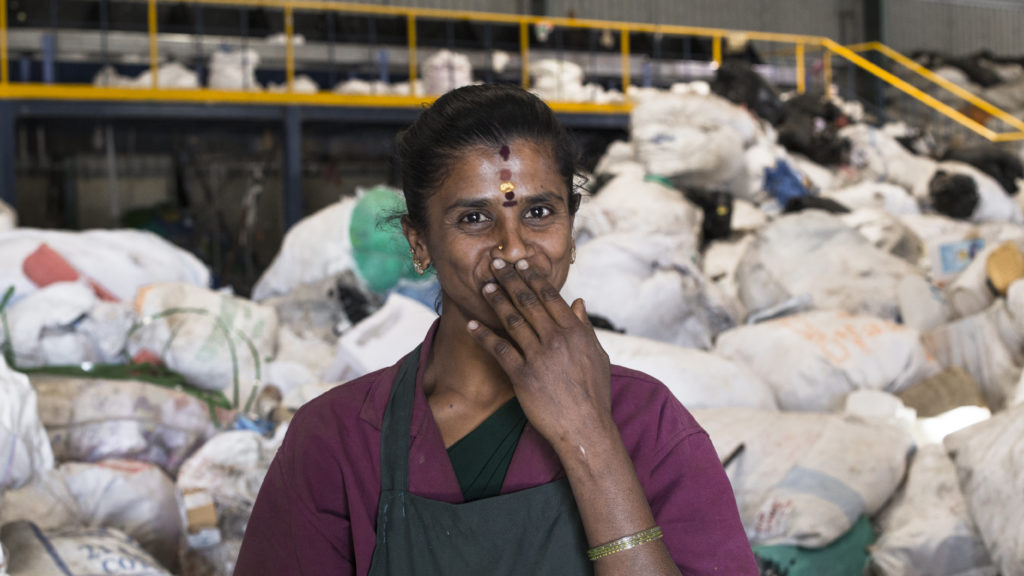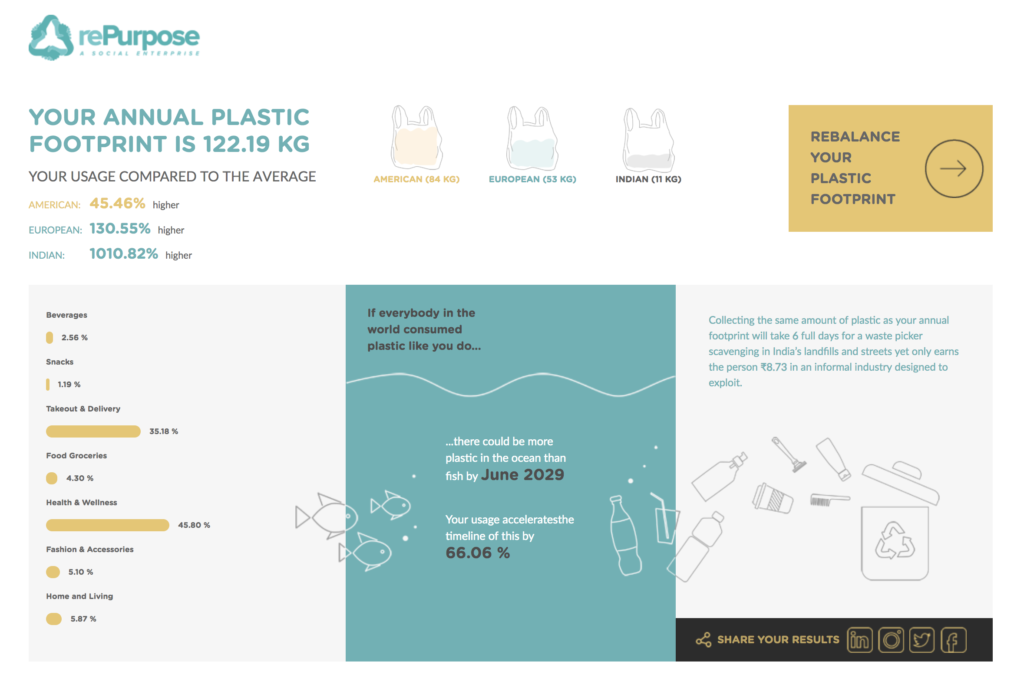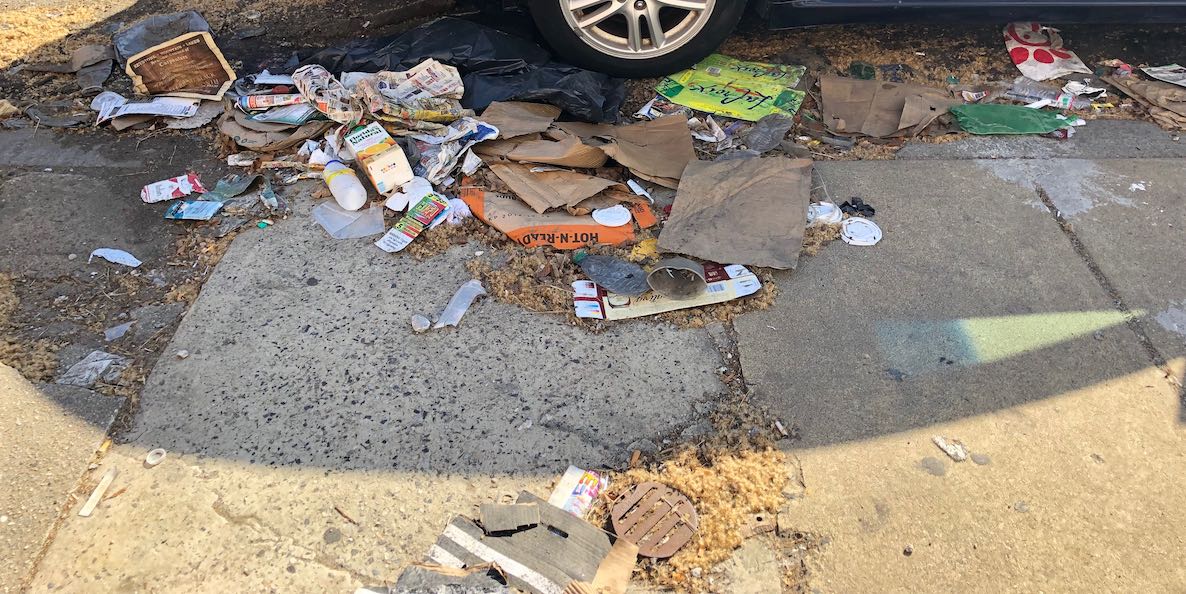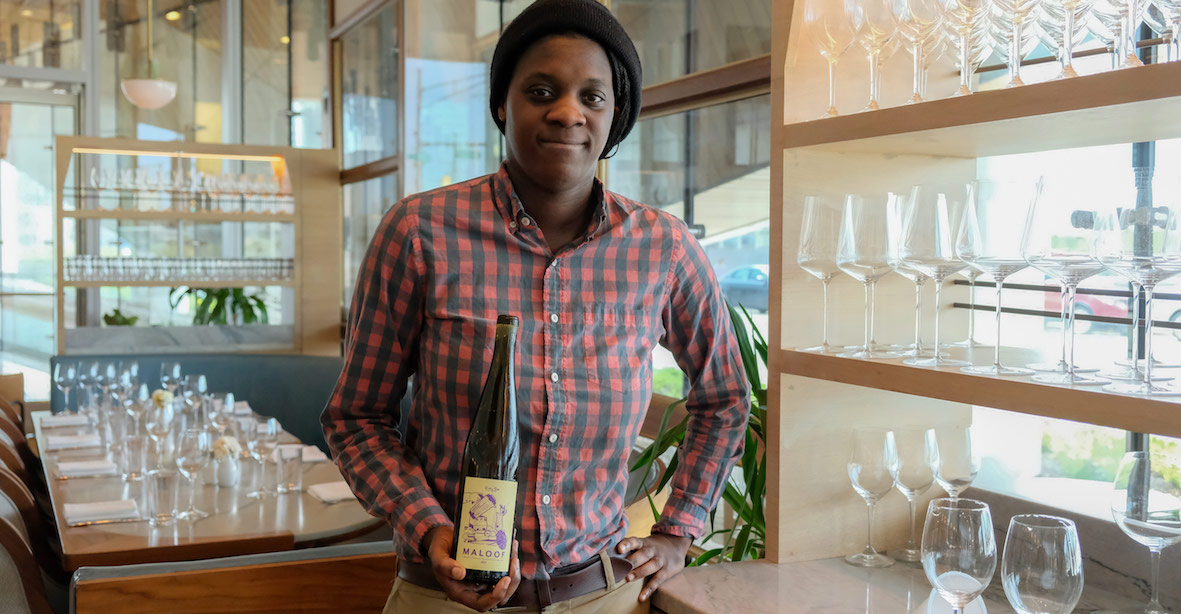When the topic of plastic comes up, it’s common for handwringing to revolve around recycling, and landfills, and whales, and islands of trash in the ocean. But there’s another set of woes that comes from the world’s insatiable appetite for plastic in its myriad forms: The exploitation of poor workers who spend their days collecting and sorting the waste for meager pay.
Much of the United States’ plastic ends up in Asia’s landfills, where these informal waste workers in cities like Mumbai, India, go from landfill to landfill—as well as from trash can to trash can—collecting recyclables. Often, they are homeless members of the “untouchable” caste, who carry bags on their backs that they fill with recyclable waste to sell to the middlemen of a long supply chain.
Even after working 16 or 17 hours a day, they earn enough for a meal or two—not even enough to pay for housing, according to Aditya Siroya, who grew up in India and has become an expert on the subject in the past few years. “Waste in India is recycled by the informal sector and is completely unorganized and unregulated,” explains Siroya. “It consists of different levels, with the people at the top extremely wealthy and running a mafia of sorts. As you go lower down the ladder you start to see that the workers are more and more exploited.”
The problem is multifaceted: the plastic itself is impacting the planet, but it is also creating an atmosphere in which the people making a living off of collecting it are easily exploited.
Experts estimate that 24 million global workers are employed in the recycling business, 80 percent of them in these informal networks. The problem, then, is multifaceted: certainly the plastic itself is impacting the planet, but it is also creating an atmosphere in which the people making a living off of collecting it are easily exploited.
![]()
Enter rePurpose, a Philadelphia-based social enterprise that helps consumers of plastic go “plastic-neutral” by giving them a way to pay for a bottle of soda—or a takeout container, or an Amazon box—to be disposed of ethically, by a waste worker who has been given a formal, living wage. By estimating their plastic intake via rePurpose’s online survey, consumers can estimate the cost of paying a worker to recycle the plastic they dispose of, then contribute that cost in a monthly payment to rePurpose. Here’s how it works: When you go to rePurpose’s website, you take a quiz about your plastic consuming habits. The quiz goes through seven categories—beverages, snacks, takeout, home and living, groceries, health, and fashion—asking you to choose which items in the category you consume; for beverages, the options include alcoholic beverages, milk, takeout coffee, and several others. It then asks you to estimate how many of such containers you use in a week. Some items, like toothpaste, shampoo, and lotion, are automatically included in everyone’s footprint.
At the end of the survey, you receive results indicating what percent of your plastic falls in each category, as well as a plastic footprint measured in kilograms, and a percentage indicating how you compare to the average American, the average European, and the average Indian. It also tells you how long it takes a waste worker in India to collect all of your recyclable material, and how much they’d earn doing it. You’re told the monthly contribution necessary to pay workers fairly for what you’re disposing of—about 25 cents per pound of plastic you consume. Finally, participants receive regular tracking information about where the money goes and how it is being spent.

The idea for rePurpose started with Peter Wang Hjemdahl, who had spent his childhood living between a Chinese megacity and the Norwegian countryside, giving him a close look at the sharp juxtaposition of settings and opportunities in the world before he arrived as a Wharton student at Penn. “I had been acutely aware of both the environmental and economic disparities that exist between the developed and developing world from a very young age,” Hjemdahl says.
With a team of colleagues, Hjemdahl applied for the Hult Prize, a $1 million dollar social entrepreneurship competition that was asking the question: “How can we double the income of 10 million people living in extreme poverty in urban slums across the world?”
![]()
The team discovered that waste picking among low-income populations in Shanghai, Cairo, Mexico City, Mumbai and many other cities was the second-highest form of employment, after street vending. “As we dug deeper, we realized that waste pickers are a part of a vibrant informal recycling industry that exists in almost every metropolis in emerging markets,” Hjemdahl explains. “This industry was especially vibrant in India, but despite turning over billions of dollars every year, it was incredibly unfair towards workers at the base of the pyramid.”
The team lost and went their separate ways, but Hjemdahl couldn’t shake his interest in solving the problem. He recruited Siroya and Svanika Balasubramanian, both fellow Wharton students, and they made their way to Mumbai in 2017 to visit Deonar, one of the world’s largest landfills, in an effort to further research the idea. “There are towers of waste on either side of you, you’re clenching your nose to the stench,” remembers Balasubramanian, who grew up in a family of activists and thus with the expectation that she would be one as well. “It really grows on you as you see this skyline of trash that as humanity we’re doing something wrong and we’re not disposing of waste in the most efficient way.”
“Plastic is not innately a bad material,” Balasubramanian says. “It reached its tipping point when we stopped using plastic in the most responsible way and instead used it to just make things a little bit easier.”
Even if you do dutifully separate your recyclables, a recent Chinese law that prohibits the import of most foreign waste means many recyclable materials are ending up in landfills across the globe. In addition, the low-value recyclables, such as chips bags, granola bar wrappers, and the packaging for large appliances like televisions, tend to end up in landfills because the difficulty and expense of recycling them means they’re often ignored by recyclers. These materials are the source of livelihood for waste workers.
![]()
(Be careful, though, what you put in your own recycling bin! While waste workers can pull food-contaminated recyclables from landfills to be transformed into various end products, food contamination in US recycling bins can lead the whole batch to be trashed. Check here for Philadelphia-specific guidelines.)
While the enterprise officially launched a year and a half ago, the trio spent much of this time exploring the area and building their network, assessing where they could make the most impact. The online platform allowing consumers to go plastic neutral launched in April, and so far approximately 350 people have signed up, with virtually no marketing. The goal is to have 10,000 people committed to going plastic neutral by the end of 2019, with a sharp uptick in users once they embark on a marketing campaign at farmers’ markets and other venues across the country.
Fifteen percent of the payment is retained for rePurpose’s operations, and the rest goes to one of three waste worker cooperatives in India that are attempting to formalize the waste collection sector: Waste Ventures India, Aasra Welfare Association, and Saahas Zero Waste. When waste workers are hired by these cooperatives, they can spend more of their time going door to door in apartment complexes and educational institutions, collecting waste at the source. They receive part of their pay via an hourly allotment, in addition to a payment based on what they are able to collect. They bring the waste back to a centralized facility, instead of selling it to someone just above them in the system. The middle men are cut out of the system, allowing the cooperatives to pay the waste workers a living wage.

The cooperatives, though, often struggle to stay afloat because they do their best to focus on low-value recyclables that are otherwise ignored, but aren’t very profitable to recycle. “They’ve been stunted so far in their growth because they were up against the exploitive middle men,” explains Balasubramanian. “They really needed funding to expand their operations.”
Waste Ventures India has formalized employment for 1,200 waste workers. According to Sahithi Bhupathiraju, an Urban Waste Manager for Waste Ventures, formalizing this sector is particularly challenging both because of the sheer number of waste pickers working in the informal economy, as well as the workers’ hesitance to relinquish the autonomy of their informal jobs. The extra contributions from rePurpose helps mitigate these concerns by keeping pay high.
“rePurpose serves as a middle ground for environmentally-conscious citizens and organizations like ours to collaborate with each other,” explains Bhupathiraju. “It allows us to increase our reach and bridges changemakers across the world.”
![]()
Anjali Mahendra, Director of Research for World Resource Institute Ross Center for Sustainable Cities, has been part of an effort to study such waste picker cooperatives in both Latin American and Indian cities. She says rePurpose is a valuable model, for several reasons. “It creates self-awareness about one’s own levels of plastic waste generation, and by extension, the levels of waste generation in a community or city,” Mahendra says. “It supports informal waste pickers in India, where these groups need all the financial and social support they can get. Providing a mechanism for conscious consumers in higher income countries to contribute in this way is an important value add.”
But Sonia Dias, a waste specialist at WIEGO—Women in Informal Employment: Globalizing and Organizing—worries that not enough research has been done on such initiatives, and cautioned that tracking its impacts is crucial to ensure the poorest people in the recycling chain are protected. rePurpose plans to have monitoring and evaluation agents on the ground at the waste facilities to measure its impact.
Currently, the co-founders’ model includes three verticals: individuals, organizations, and events, and they have been piloting various initiatives to see what sticks. In addition to helping individual consumers offset the cost of their plastic use, they also want to onboard organizations to offer their employees curricula on how be more conscious purchasers and to pay for their employees and operations to go plastic neutral. “Many companies have dedicated budgets for employee engagement. Instead of pens or water bottles, this would be a more meaningful gift for employees,” Siroya says. While they have not officially onboarded any companies, they have unofficial commitments from three organizations with more than 1,200 employees total.
The online platform allowing consumers to go plastic neutral launched in April, and so far approximately 350 people have signed up. The goal is to have 10,000 people committed to going plastic neutral by the end of 2019.
The company is currently working with Penn on including rePurpose as part of its Green Office Program, in which offices in the university can earn points through various recycling and sustainability activities in order to move upward through four levels of certification. By going plastic neutral, offices will be able to earn points toward the next level.
They also piloted a campaign with the Chez Yasmine food truck in University City in which the vendor talked to consumers about plastic consumption, and rePurpose paid to offset one pound of plastic for each customer who subsequently mentioned them on social media. They ended up offsetting the cost of 40 pounds of plastic in the campaign, and plan to replicate it with restaurants and retailers in University City and Center City in early June.
Eventually, the team would like to work with companies to allow people to choose to offset the cost of their plastic use at the time of purchase. For example, Grubhub could add a checkbox to their ordering screen where consumers could choose to add a few cents to make their purchase plastic neutral, or Grubhub could even choose to cover the cost for consumers itself. Additionally, companies and organizations can utilize rePurpose staff as consultants in making large events plastic neutral.
Currently, rePurpose is operating off of the $200,000 in award and living expenses the co-founders won from Penn’s President’s Engagement Prizes, designed to support just-graduated Penn students to engage in a local, national, or global project. Hjemdahl and Balasubramanian have since graduated from Wharton, and Siroya took a year off from school to focus on the venture full-time. Eventually, the social enterprise will operate and profit from the 15 percent they retain from individuals’ contributions, in addition to the fees that will be paid by organizations and event-holders.
The team, all students of business, chose to work as a for-profit because they believed it to be the best way to be successful in making change, something they learned in their time at Wharton. “It wasn’t until freshman year in college that I discovered social entrepreneurship and realized for the first time that through social business, one can actually do well and do good at the same time,” explains Hjemdahl. “That concept absolutely fascinated me.”
While the enterprise is just tackling plastic for now, Siroya says they eventually hope to move into paper, food waste, and other arenas. “The broader vision is to apply this framework to any material stream that has economic and social values,” he says. “For paper, the offset could be planting a new tree.”
In addition to allowing individuals to offset the cost of their plastic consumption, rePurpose also offers participants tips for reducing their plastic usage. This, of course, could plausibly deprive the waste workers rePurpose supports of materials to collect, thus impacting their livelihood. Balasubramanian says that rePurpose team has discussed this, and that they aren’t worried—even if consumers drastically reduce their usage, particularly of single-use plastics, plenty will still be out there.
“Plastic is not innately a bad material. It reached its tipping point when we stopped using plastic in the most responsible way and instead used it to just make things a little bit easier,” she explains. “There’s always going to be plastic that we have to use for the way we live life, and this is their livelihood. How do we do this in a way that makes sense as well?”
Photo via rePurpose







